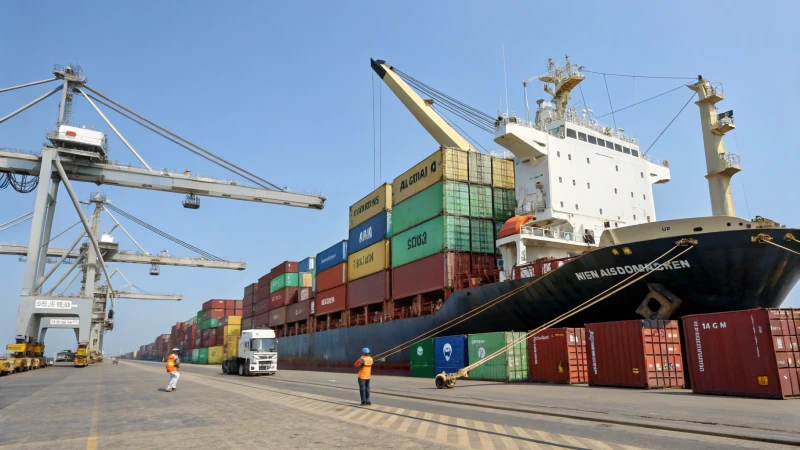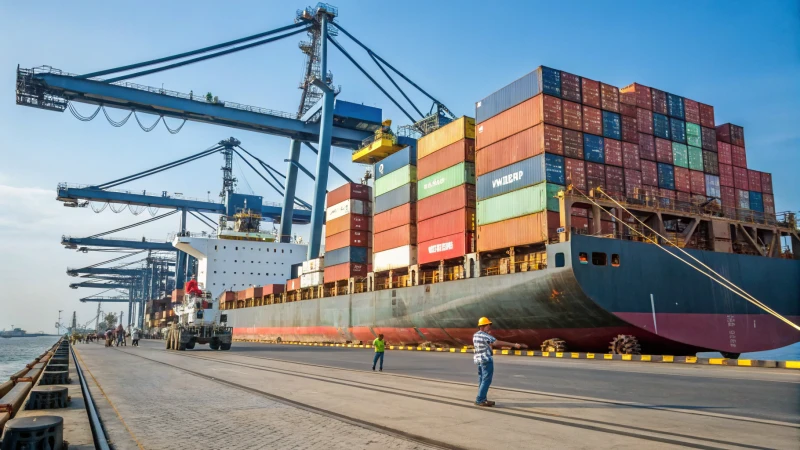Ever felt overwhelmed by the logistics of shipping large quantities of goods? You're not alone.
A bulk shipment involves moving large amounts of unpacked goods, directly loaded into vessels or containers. Commonly used for items like grains, coal, and liquids, this method offers cost savings and simplified logistics.
When I first started dealing with bulk shipments, I was amazed by how efficient they could be. Imagine needing to move a mountain of grain or a sea of oil—bulk shipping makes it possible. It's like Tetris for grown-ups! Understanding the mechanics behind it, from loading to transportation, not only streamlines my business operations but also cuts down on costs significantly. Let's explore how bulk shipments can transform your logistics strategy and why they might just be the game-changer you've been looking for.
Bulk shipments are only for unpacked goods.True
Bulk shipments involve transporting large quantities of unpacked goods.
Bulk shipments increase logistics costs.False
Bulk shipments offer cost efficiencies by transporting large volumes.
What Types of Goods Are Commonly Shipped in Bulk?
Ever wondered what fills those massive cargo ships cruising across the oceans? Let's dive into the world of bulk shipping and discover the goods that make it tick.
Commonly shipped bulk goods include grains, coal, crude oil, and chemicals. These goods are transported in large volumes using specialized vessels or containers, optimizing cost-effectiveness and efficiency in global trade.

Dry Bulk Commodities
Imagine standing in a bustling port as towering cranes unload mountains of grain from colossal ships. Grains like wheat and corn are a staple in bulk shipping. It's like watching the lifeblood of global food supply chains flowing before your eyes. I've often marveled at how these simple grains support economies worldwide, feeding millions. Then there's coal1, a powerful resource still pivotal for energy production. I remember a trip to a mining town where coal dust seemed to be woven into the very fabric of life. And let's not forget minerals like iron ore, essential for steel-making2. These raw materials are the backbone of industries everywhere.
| Commodity | Usage |
|---|---|
| Grains | Food supply |
| Coal | Energy |
| Iron Ore | Steel Making |
Understanding the demand for these commodities can truly transform how businesses approach their shipping strategies.
Liquid Bulk Cargo
The world of liquid bulk cargo is fascinating, involving the likes of crude oil and chemicals. Picture vast tankers gliding across the sea, each one a floating fuel station essential for our energy needs. I once toured an oil refinery, and the sheer scale of operations was mind-blowing. Chemicals, too, are shipped in vast quantities, supporting everything from pharmaceuticals3 to manufacturing. These specialized tankers are crucial for keeping industries running smoothly across the globe.
- Crude Oil: Vital for energy.
- Chemicals: Crucial for industries.
Liquid bulk requires specialized tankers to ensure safe transport over long distances.
Break Bulk Cargo
Break bulk cargo takes me back to my early days in logistics when I first saw machinery and vehicles being loaded individually onto ships. It’s a different beast altogether from bulk shipping but shares similar challenges. The introduction of automation4 in these processes has been a game-changer, boosting efficiency significantly.
Why Bulk Shipping Dominates
There's something almost poetic about the efficiency of bulk shipping—it moves massive quantities at lower costs, sustaining supply chains and slashing per-unit expenses. I've seen firsthand how advancements in freight technology5 continue to streamline operations, making bulk shipping indispensable in today’s logistics landscape.
Embracing these technological advancements further reduces costs and delivery times, anchoring bulk shipping firmly in modern logistics systems.
Grains are shipped in bulk for food supply.True
Grains like wheat and corn are key food supply exports.
Crude oil is not a bulk commodity.False
Crude oil is a major liquid bulk commodity for energy.
How Do Bulk Shipments Compare to Other Shipping Methods?
Shipping can feel like a maze, especially when you're knee-deep in logistics for your business. Ever wondered how bulk shipments hold up against the rest?
Bulk shipments shine by cutting costs and boosting efficiency, especially for large amounts of unpacked goods. Unlike container shipping, they slash packaging expenses and make the most of space, ideal for goods like grains or liquids.

Understanding Bulk Shipments
Bulk shipments typically involve the transportation of large quantities of unpacked goods directly loaded into a vessel or container. This method is commonly used for commodities6 such as grains, coal, or liquids. It reduces packaging costs and maximizes space, providing a cost-effective solution for certain industries.
| Pros | Cons |
|---|---|
| Cost-effective for large volumes | Limited to specific types of goods |
| Efficient space utilization | Requires specialized handling equipment |
| Reduced packaging needs | Potential for cargo spillage |
Comparing to Containerized Shipping
I've often relied on containerized shipping for its security and versatility. Packing goods into standardized containers feels like tucking them into a safe box, suitable for anything from electronics to clothing. However, the costs can add up with all the packaging involved.
Key Differences:
- Flexibility: Containerized shipping can handle a diverse range of products, while bulk is more suited for homogenous goods.
- Security: Containers provide better protection against theft and damage.
- Costs: Bulk shipments often have lower per-unit costs due to reduced packaging.
Break Bulk vs. Bulk Shipments
In my earlier days in trade, I discovered break bulk shipping—a method where goods are transported in bags or crates rather than in bulk. It's perfect for unique items but comes with higher handling costs compared to bulk shipments.
| Break Bulk | Bulk Shipments |
|---|---|
| Suitable for unique items | Best for homogenous goods |
| Higher handling costs | Lower handling and packaging costs |
| Flexible but less efficient in space use | Efficient in space use |
The Role of Technology in Shipping Methods
Technological advancements have been a lifeline for me in managing logistics. Automated systems streamline loading processes and tracking capabilities, enhancing efficiency across all shipping methods.
Explore more about how technology7 reshapes modern shipping logistics and its future potential.
Understanding these differences has been crucial in making informed decisions about which shipping method suits my needs best. Whether it's cost savings or security concerns, each method offers unique advantages that are worth considering.
Bulk shipments reduce packaging costs significantly.True
Bulk shipments eliminate the need for extensive packaging, cutting costs.
Containerized shipping is less secure than bulk shipments.False
Containerized shipping offers better protection against theft and damage.
Why Opt for Bulk Shipments?
Picture this: a bustling warehouse filled with neatly stacked goods, all ready to be shipped in bulk. It's a sight that makes my heart race, knowing the benefits it brings.
Choosing bulk shipments means unlocking cost savings, boosting efficiency, and reducing your carbon footprint. By consolidating shipments, I can cut down on per-unit costs, streamline operations, and make a positive environmental impact.

Cost Efficiency
When I first started experimenting with bulk shipments, I was amazed at the cost efficiency it offered. Imagine shipping large quantities of consumer electronics from China and seeing those costs per unit8 drop significantly. Leveraging economies of scale means I save on packaging and transportation fees—it's like watching my expenses shrink as my shipment sizes grow.
Enhanced Operational Efficiency
There's something incredibly satisfying about streamlining operations. By consolidating shipments, I find myself reducing handling time9 and minimizing the risk of damage. With fewer shipments to juggle, my inventory management has never been more agile. The faster turnaround times give me an edge in the competitive market of consumer electronics.
Environmental Impact
As someone who cares deeply about sustainability, the environmental benefits of bulk shipping are a huge draw. Fewer trips mean less fuel consumption and emissions. Every time I choose bulk, I feel like I'm taking a step toward a greener supply chain—a small change that makes a big difference in sustainable logistics10.
Practical Considerations
Of course, maximizing these benefits requires careful planning. I've learned to consider factors like shipping routes, carrier options, and container types11 to ensure efficiency and cost-effectiveness. Working closely with logistics partners has allowed me to tailor solutions specifically to my needs, making every shipment a well-oiled machine.
| Benefit | Description |
|---|---|
| Cost Savings | Reduced per-unit costs by shipping larger quantities. |
| Operational Efficiency | Streamlined processes with fewer shipments and improved inventory control. |
| Environmental Benefits | Decreased emissions due to fewer trips and optimized shipping strategies. |
| Customizable Solutions | Tailored logistics solutions to fit specific business needs, including route optimization and carrier selection. |
Understanding these benefits has transformed my approach to logistics and strengthened my overall business strategy. By exploring these options further, I'm able to see how they can be tailored to fit my specific needs.
Bulk shipments reduce per-unit shipping costs.True
Shipping in bulk allows businesses to leverage economies of scale.
Bulk shipments increase carbon emissions due to larger loads.False
Bulk shipments reduce trips, leading to lower fuel consumption and emissions.
Conclusion
Bulk shipments transport large quantities of unpacked goods, optimizing logistics and reducing costs. Commonly used for grains, coal, and liquids, they enhance efficiency in global trade.
-
Explore global coal export trends and how they impact energy markets. ↩
-
Discover how iron ore is crucial in steel manufacturing and global trade. ↩
-
Learn about the significance of chemicals in pharmaceutical manufacturing. ↩
-
Find out how automation is revolutionizing break bulk cargo logistics. ↩
-
Check out recent innovations enhancing freight logistics efficiency. ↩
-
Explore which commodities are ideal for bulk shipping to maximize cost efficiency and space utilization. ↩
-
Discover how technology is revolutionizing logistics and improving efficiency across various shipping methods. ↩
-
Learn how shipping in bulk lowers individual product costs through economies of scale. ↩
-
Discover how consolidating goods into fewer shipments speeds up processing times. ↩
-
Understand the environmental benefits of reducing trips and optimizing routes. ↩
-
Explore container options that affect cost and efficiency in bulk shipping. ↩




